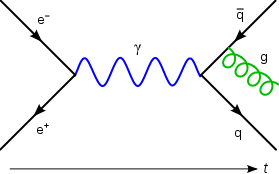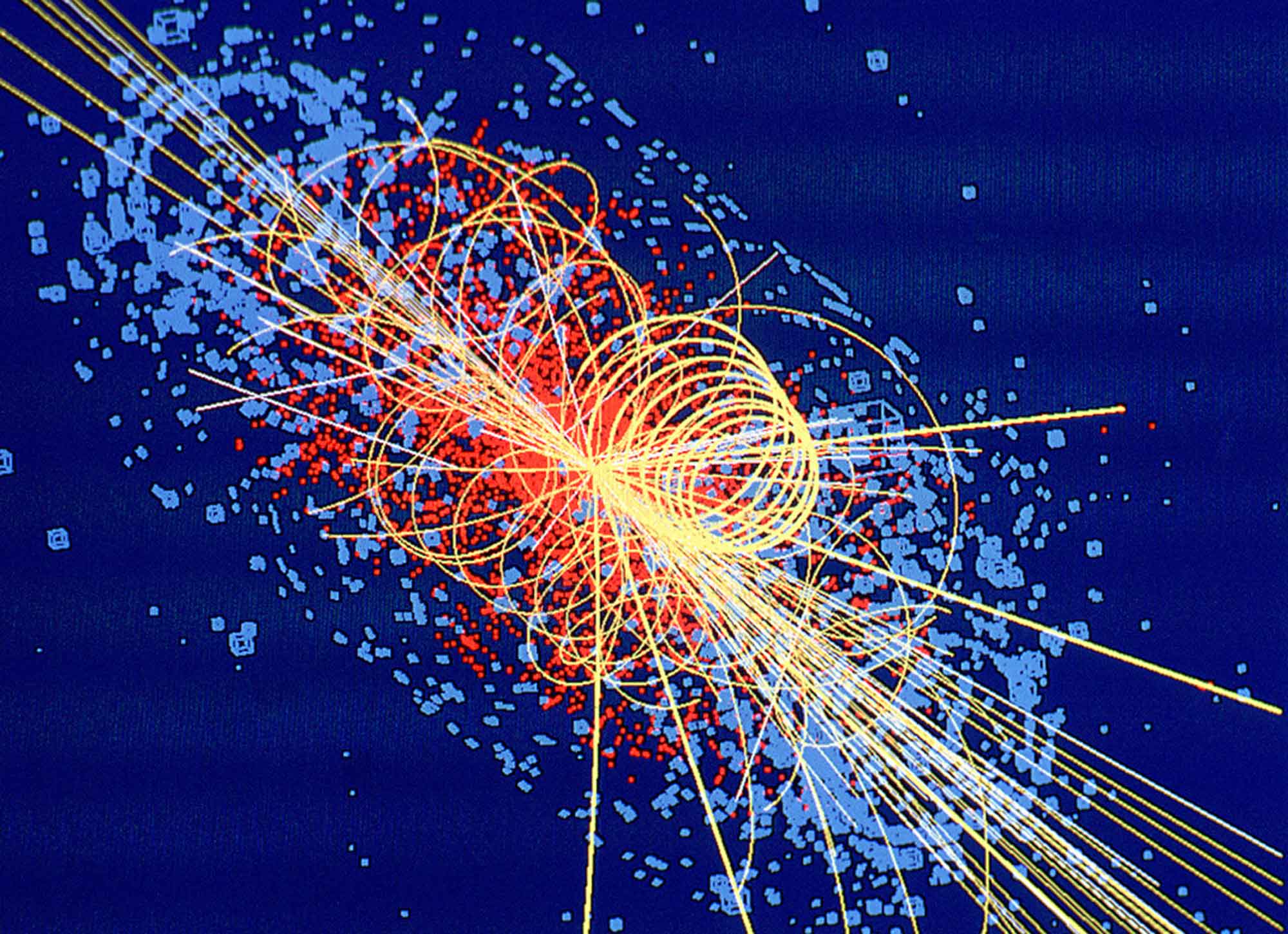Comments
-
Why is this reality apparent as opposed to other possible worlds?Charles Sanders Peirce's careful distinction of existence from reality might be helpful here. "Real" means that something possesses properties sufficient to identify it, regardless of whether anyone ever attributes them to it, while "exists" means that something reacts with other things. Hence all possible worlds are real, but only our actual world exists. — aletheist
Um, perhaps you've not been paying attention, but we know the other worlds exist because they interact with each other and with our world. -
Why is this reality apparent as opposed to other possible worlds?The question I am asking is, if 'parallel universes or histories is the solution, what is the problem?' Why is it necessary to postulate such an apparently bizarre notion in the first place? What problem is it trying to solve? — Wayfarer
You could ask what problem does entanglement solve? What problem does superposition solve? What problem does the Heisenberg Uncertainty Principle solve?
Or, when dealing with General Relativity, what problem do black holes solve? What problem do gravitational waves solve?
Parallel "universes" are a prediction of unitary i.e. Everettian quantum mechanics, which, as a by product, solve a number of other problems: e.g.
The Measurement Problem.
The nature of probability.
The arrow of time.
The meaning of counterfactuals.
The meaning of complexity.
A couple of other discoveries that were made within Everettian QM, but are arguably theory-neutral ( I disagree)
The possibility of quantum computers.
The existence of decoherence.
So, taking QM seriously as a theory of reality solves many problems, and renders it testable. Parallel "worlds" are a prediction. -
Why is this reality apparent as opposed to other possible worlds?I take issue with the first sentence:
The idea that quantum theory is a true description of physical reality
If it's not true, then what? That is the philosophical question. — Wayfarer
But that isn't the first sentence, is it? -
Physics and computability.Statistically not so! The reality that is real is the one most probable to occur according to the evolution of the wavefunction. The rest aren't as real! — Question
You've clearly not been paying attention. -
Why is this reality apparent as opposed to other possible worlds?According to Everettian QM, the other branches are real. You are experiencing the other branches that you happen to be in. Your counterparts in other branches are just as real as you are.
-
Why is this reality apparent as opposed to other possible worlds?All branches of the wavefunction are equally real.
-
Physics and computability.This is interesting and I don't dare to contest those findings by such brilliant minds. However, how does one explain that man can do what he wills but he cannot will what he wills? — Question
That statement is obviously false. It is perfectly possible to reprogram yourself to will, or desire different things. People do it all the time. -
Physics and computability.No models that we use involve these numbers of functions, so that mathematical truth is irrelevant to our present models that we use. Just like non-Euclidean geometry or Computer science was irrelevant to people during Antiquity. — ssu
That is wrong. There *are* models that we use that are non-computable, in the sense that they do not obey the CTD-Principle.
Quantum mechanics obeys the CDT-Principle, as does QFT and the Standard Model. Any future theory will also obey CDT. In fact CTD is a guide to future theories, as are the conservation laws. -
Physics and computability.There are non-computable numbers, you know. — ssu
Most number, overwhelmingly most, are non-computable. Most mathematical functions are similarly non-computable. No physics involves these numbers or functions, so that mathematical truth is irrelevant to computing or simulating reality. In reality, only computable numbers and functions matter. -
Physics and computability.I should say that I am a firm believer in the PoS (Principle of Sufficient Reason) namely that every cause or effect is intelligible in nature (which kind of automatically makes me a subscriber to Everettian Quantum Mechanics). — Question
The Principle of Sufficient Reason is shown to be false* by the Free Will Theorem of Kochen and Conway. This is discussed in the 1st hour of the 6hr series of lectures given by Conway at Princeton:
*Conway's arguments seem to imply that super-determinism would rescue the PSR, but I'm not sure the PSR has any meaning in that context. -
Physics and computability.Fortunately the fact that the measurement part of the deal is informal and thus incomputable means we can dismiss such metaphysical flights of fancy. We already know the epistemology of the scientific method doesn't support it. — apokrisis
Under realist no-collapse quantum mechanics, measurements are no different from any other type of interaction - they are reversible.
In fact, it is this reversibility that will eventually settle the case, as it leads to different predictions. So much for metaphysics. -
Physics and computability.So, my question is...
In order to answer such fascinating questions as 'Is the universe deterministic?', then one need compute said physical laws as per the Church-Turing-Deutsch Principle and via such a method of replicating the laws of nature inside a computer, then it can be asserted the truth or falsehood of such statements.
If not, then how else to determine the validity of such statements? — Question
You can tell if certain physical laws are deterministic just by looking at them. In particular, if they are time-symmetric, then they are deterministic.
General relativity is time-reversible, and therefore deterministic. As I'm sure you are aware, it is a little more than that - it predicts a stationary block-universe in which all instants coexist.
Realist non-collapse quantum mechanics is also time-reversible therefore deterministic. More than that, it predicts a stationary block-multiverse in which all instants and universes coexist.
Have you noticed no CTD-Principle yet? The determinism questioned is answered already!
Here's another question, "How is knowledge possible?" Or if you prefer, "If reality is comprehensible, then what makes it so?"
The CDT-Principle answers that question.
And, by the way, the CDT_Principle is proved. -
Problematic scenario for subjective idealismReading something, no matter who wrote it, doesn't mean agreeing with it. Hell, even the philosophers I like best are folks with whom I agree no better than half of the time, and there are plenty of philosophers with whom I disagree literally multiple times per sentence. — Terrapin Station
Sure, but can you find a single point of disagreement with Popper's realist epistemology? -
Problematic scenario for subjective idealismHave you ever come across the word "simulation" before? — Metaphysician Undercover
Sure, that is HOW scientists create the images and WHAT they use the computing time for.
Because visualisation is such a powerful tool, scientists go to great lengths to visualise aspects of reality they are investigating.
But then again, sometimes they just draw sketches:

-
Problematic scenario for subjective idealismThe problem is, that these images don't adequately represent concepts which cannot be represented by images, so all they're doing is making an appeal to the sensibilities of common people who enjoy such phantasms. That they spend a great deal of time and computing power on this is an indication that they need public funding. — Metaphysician Undercover
But that is the actual image which confirmed the discovery of the Higgs boson. -
Problematic scenario for subjective idealismI'm sure you are aware that in modern physics there is a large number of sub-atomic particles. The existence of the particles are understood with mathematics. When speaking to physicists, they will often caution you, not to try to visualize the things which they are telling you about. The words used, such as "particle", tend to bring up certain images, but you are told by the physicists not to refer to these images. The concepts are purely mathematical, and the words in the context of particle physics, refer to these mathematical concepts, rather than any image you can make in your mind. — Metaphysician Undercover
Physicists spend a great deal of time and computing power creating images of what they are studying, including new fundamental particles:

-
Problematic scenario for subjective idealismYeah but the default position is realism, and one generally comes to idealsim through epistemic concerns about realism. — dukkha
All that means is that one has yet to read Popper. -
Problematic scenario for subjective idealismHave you got any examples of materialists who espouse spiritual ideals? How could the two co-exist? — Wayfarer
Have you got any examples of an Idealist espousing spiritual ideas? -
If a tree falls in a forest...
The view that autonomous and complex entities are real, is isomorphic with realism. Sorry. -
If a tree falls in a forest...You're not a realist if you don't believe that, because otherwise, your position is no different from anti-realism, as I'm sure Michael well tell you, or SEP, if you look. The central point of realism is mind-independence. — Marchesk
You could phrase it differently: A realist holds that, if according to the simplest explanation, an entity is complex and autonomous, then it is real.
An autonomous entity does no come into and go out of existence depending on whether a human happens to be looking at it. And no one who thinks it does can be described as a realist. -
If a tree falls in a forest...What's complex about it? Mental phenomena exists and behaves in certain ways. How is it any different to saying that physical things exist in behave in certain ways? — Michael
Things coming into and out of existence depending on whether they are being perceived by a consciouses or not, is hugely complex.
Also, while non-existing, reality clearly creates records. How does it do that while it doesn't exist? -
If a tree falls in a forest...And the idealist would agree. They'd just say that the real things we experience don't continue to exist after the experience ends. — Michael
What do you gain by adding that much complexity, plus the added problem you have of non-observed-therefore-non-existent reality creating records. -
Dogmatic RealismSpecial Relativity is the one that does in absolute space. Kant beat Einstein to it (so did Leibniz, btw.. but that's beside the point.) — Mongrel
Historical revisionism does you no credit. And it is General relativity that curves space-time to the extent that triangle (self-evidently or not) do not in general have internal angles totaling 180degrees, as demonstrated by Gauss in 1820s.
Thus Idealism is refuted. -
Dogmatic RealismBut isn't it that the idealist believes we shape the world by what we think? — Mongrel
Which makes it difficult to explain how self-evidently true Euclidean space (as Kant thought) got overturned by General Relativity. -
What is the best realist response to this?Outside world simply refers to that part of your experience you don't control. You don't control that you'll meet the lion on your way to work. That part of your experience is outside of your control — Agustino
Why does the "outside world" have a history? Why are there fossils? -
Dogmatic RealismYeah, I mean a common refrain you’re going to hear from the dogmatic realist is that idealism collapses into solipsism when taken to its logical conclusion. Assuming that solipsism can’t be decisively refuted, that it is internally consistent, that it is consistent with everything we could possibly experience, etc., then one is simply faced with a choice that amounts to a matter of preference. So either bite the bullet and accept solipsism, or try to find an intelligible alternative. — Aaron R
It seems that solipsism proposes a theory of reality exponentially more complicated than realism without providing an explanatory structure. Solipsism is forced to admit that the reality that it creates is exactly like physical reality, as surprising as physical reality, and precisely as difficult to understand as physical reality but on top of that it is created by a mind to be that way for no reason.
Solipsism (and variants) is just an indefensible over-elaboration of realism, while remaining logically consistent. -
If a tree falls in a forest...
What exists is the experience of a photograph of a forest. — Michael
Why is it a photograph of a forest, and not a photograph of an ocean? -
Who here believes in the Many World Interpretation? Why or why not?David Deutsch on twitter and always answers my questions there.
I'd at least try to read the paper I linked to though - the one where the CTD Principle is elucidated and the quantum computer invented. You are misrepresenting the CDT Principle, which makes you look like you don't begin to understand it. -
If a tree falls in a forest...But if the photograph is of a forest, then does the forest come into existence when you look at the photograph? If not, then why is it a picture of a forest and not an ocean?
-
If a tree falls in a forest...The idealist doesn't claim otherwise. They just claim that trees need to be seen for there to be trees. It doesn't require that I'm the one doing the seeing. For the umpteenth time, there's a difference between "to be is to be perceived" and "to be is to be perceived by me". — Michael
Will a camera suffice, or does it need to be a human. -
'See-through' things (glass, water, plastics, etc) are not actually see-through.What is the shape of the stick when no one is using any senses to observe it? — Harry Hindu
The stick is straight. Looking at a stick does not change its shape. -
If a tree falls in a forest...Is the photon from a distant star one minute away not yet perceived real, or only conceptual until we perceive it? — Marchesk
Do you mean lie was the cosmic microwave background real before we predicted it, planned to look for it, but discovered it by accident anyway? -
Who here believes in the Many World Interpretation? Why or why not?I have yet to see proof that every physical law can be computed, which you (by the way) state as an absolute truth(?) Until then this is an unsubstantiated claim that you're throwing around here and there. — Question
Try this
http://www.daviddeutsch.org.uk/wp-content/deutsch85.pdf
or Google -
Who here believes in the Many World Interpretation? Why or why not?Yet, that statement requires much-needed justification! — Question
You need to study the scientific method. There is no justification, there are no "good reasons", such things are unobtainable and of no use. -
The alliance between the Left and IslamYou know me so well, arsehole. — unenlightened
Precisely, you will insult me (though you wouldn't dare to do so to my face) but you won't say a word against the Orlando terrorist who targeted homosexuals.
tom

Start FollowingSend a Message
- Other sites we like
- Social media
- Terms of Service
- Sign In
- Created with PlushForums
- © 2026 The Philosophy Forum